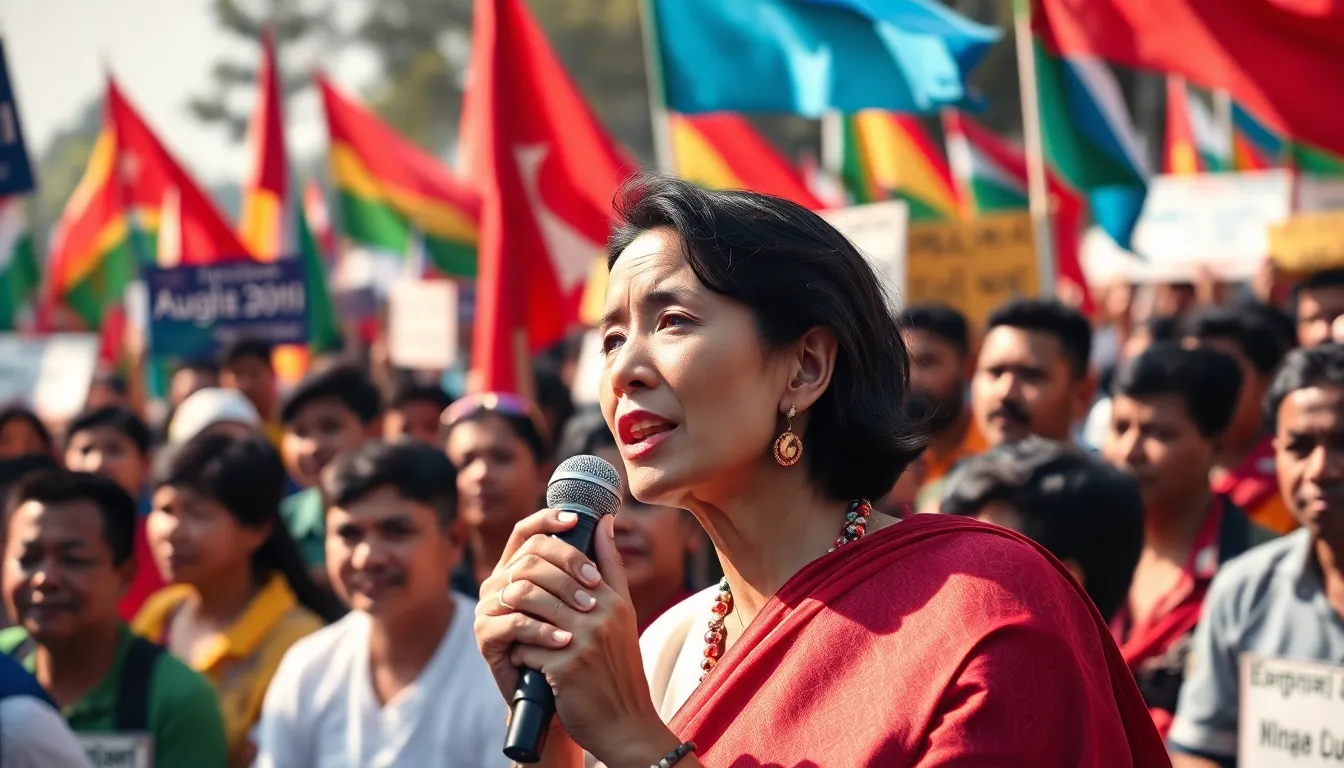Table of Contents
ToggleIn the heart of Southeast Asia, a political drama unfolded that has left many scratching their heads and raising eyebrows. The leader of the National League for Democracy (NLD) in Burma, once a beacon of hope for democracy, has faced unexpected twists that could rival any soap opera plot. From triumph to turmoil, the journey has been anything but dull.
As the world watched, the fate of this influential leader took a turn that few anticipated. With military coups, protests, and a struggle for democracy, the story reveals the resilience of a nation and its people. Curious about what really happened? Buckle up as we dive into the ups and downs of this political saga and uncover the truth behind the headlines.
Background of the NLD and Its Leader
The National League for Democracy (NLD) emerged in 1988, advocating for democratic reforms in Burma. Founded by Aung San Suu Kyi and other prominent leaders, the party sought to challenge military rule. NLD gained significant popularity, winning a landslide victory in the 1990 general elections. Although the military junta refused to recognize the results, the party continued to symbolize hope for democratic governance.
Aung San Suu Kyi, as the party leader, became an international icon for her dedication to non-violent resistance. Her commitment to human rights earned her multiple awards, including the Nobel Peace Prize in 1991. Following years of house arrest, she led the NLD to a historic victory in the 2015 elections, marking the first step towards democratic transition in decades.
Under her leadership, the NLD focused on economic reforms, peace negotiations with ethnic armed groups, and human rights improvements. Challenges persisted, however, with criticisms regarding the Rohingya crisis and limited freedoms for dissenters. The military coup in February 2021 disrupted these efforts, placing Aung San Suu Kyi in detention and dismantling the civilian government.
Post-coup, the NLD leadership faced immense challenges. Despite repression, they continued to command significant public support. Resistance movements emerged, demonstrating the people’s determination to restore democracy. Reports indicate individuals within the NLD continue to operate underground, advocating for the return of civilian rule, highlighting the party’s resilient spirit in adversity.
NLD’s political journey illustrates the complexities of Burma’s struggle for democracy. The party’s commitment to justice and governance remains a rallying point for many citizens. This ongoing saga sheds light on the significance of grassroots movements in combating authoritarianism.
Political Landscape in Burma

Burma’s political landscape has shifted dramatically in recent years, with various dynamics at play. The country’s struggle for democracy remains contentious amid ongoing turmoil.
Key Events Leading to Recent Changes
Military rule took center stage following the February 2021 coup, which ousted Aung San Suu Kyi. Protests erupted nationwide as citizens demanded the restoration of democracy. In the aftermath, the military cracked down on dissent, leading to widespread arrests and violence. Resistance movements gained momentum, highlighting the populace’s determination to oppose authoritarianism. Each significant event further complicated the path to stability, showcasing the entrenched divisions within the country.
Major Players in the Political Arena
The National League for Democracy stands at the forefront with Aung San Suu Kyi symbolizing its resilience. The State Administration Council, led by General Min Aung Hlaing, represents the military’s grip on power. Various ethnic armed groups play a crucial role, advocating for their rights while opposing military dominance. Civil society organizations also contribute significantly, voicing the perspectives of the citizens affected by political repression. These players collectively influence the ongoing struggle, shaping the future of Burma’s political landscape.
The Fall of the NLD Leadership
The fall of the NLD leadership marks a significant turning point in Burma’s political landscape. Aung San Suu Kyi, once a beacon of hope, faced an unexpected detention following the military coup in February 2021.
Circumstances Surrounding the Leader’s Disappearance
Circumstances surrounding her disappearance reveal a deeply concerning narrative. Detained by the military junta, she faces multiple charges that critics view as politically motivated. Various reports indicate that the military regime conducted her arrest without due process. Her detainment coincided with the military’s efforts to suppress dissent, targeting NLD leaders and activists across the country. Following her disappearance, a climate of fear emerged among supporters. Many continue to rally, despite the risk of violence from military forces.
International Reactions and Criticism
International reactions highlight widespread condemnation of the coup and its aftermath. Numerous countries, including the United States, swiftly condemned the military’s actions, calling for her immediate release. Human rights organizations expressed outrage, emphasizing violations occurring under military rule. The United Nations urged military leaders to honor democratic principles and respect human rights. Global public opinion rallied in support of the NLD and its leadership, demonstrating solidarity with Burma’s pro-democracy movements. Such international pressure continues to influence ongoing discussions regarding sanctions and diplomatic responses to the situation.
Current Situation of the NLD Leader
Aung San Suu Kyi remains detained, and her situation continues to evolve amid ongoing political turmoil. Reports indicate that she faces multiple charges, many viewed as politically motivated.
Legal Status and Charges
Charges against Aung San Suu Kyi include corruption and violating official secrets law. These accusations arise following her detention during the February 2021 coup. Legal proceedings lack transparency, raising concerns about fair trial standards. The military junta’s actions reflect systematic efforts to undermine democratic institutions and suppress dissent. Experts highlight that her detention serves as a tactic to weaken opposition to military rule. Supporters contend that such charges aim to tarnish her legacy and stabilize the junta’s power.
Impact on the NLD and Its Supporters
The National League for Democracy faces significant obstacles due to leadership changes and ongoing repression. Public support for the NLD remains strong, evidenced by persistent protests and civil disobedience campaigns. Supporters exhibit resilience in the face of military violence, aiming to restore democratic governance. Grassroots movements rally behind the NLD’s principles, advocating for human rights and political freedoms. Membership in NLD increases as citizens seek to oppose military oppression. International community response bolsters these local movements, providing a beacon of hope for democracy in Burma.
Future Prospects for the NLD
The future of the National League for Democracy (NLD) remains uncertain amid ongoing political volatility in Burma. Multiple factors will influence the party’s trajectory.
Potential Scenarios and Outcomes
In one scenario, the NLD could regain political power through sustained public support and organized resistance. Protests and civil disobedience campaigns indicate solid backing for democratic reforms. If international pressure remains steadfast, it may compel the military junta to reconsider its hardline stance.
Another possibility involves a prolonged stalemate, where the NLD operates in exile while dissident movements strive for democracy from abroad. This scenario risks fragmentation of the pro-democracy coalition and could weaken resolve among supporters. In contrast, a third outcome may involve potential negotiations between the military and NLD, which could lead to political compromise if concessions are made.
Although uncertainties abound, the NLD’s commitment to democratic principles continues to resonate with the public, ensuring its relevance in the political landscape.
The situation surrounding the leader of the NLD in Burma remains precarious yet resilient. Despite her detention and the military’s attempts to stifle dissent the spirit of democracy continues to thrive among the people. The NLD’s enduring support reflects a deep-rooted desire for political freedom and human rights.
As the political landscape evolves the potential for change remains. Grassroots movements and international backing play crucial roles in shaping the future of democracy in Burma. The ongoing struggle highlights not just the challenges faced but also the unwavering commitment of the Burmese people to reclaim their voice and rights. The journey ahead may be fraught with difficulties but hope persists for a brighter future.




